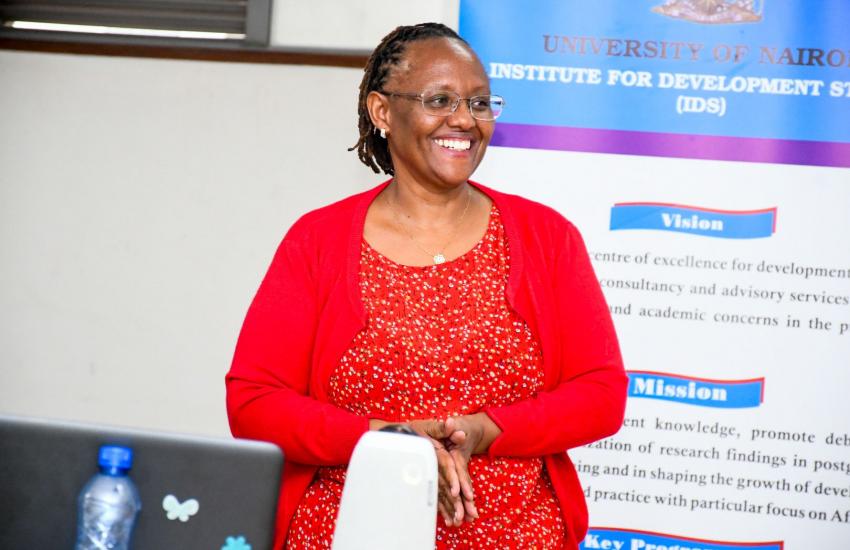IDS implements the Pathways to Success: Enhancing Women’s Postgraduate Completion Rates at the University of Nairobi project
The Institute for Development Studies (IDS) in collaboration with Queen Mary University of London (QMUL)’s Centre for Research in Equality and Diversity is implementing a project titled Pathways to Success: Enhancing Women’s Postgraduate Completion Rates at the University of Nairobi.
Many women pursuing postgraduate (PG) education in Kenya face significant barriers that hinder their ability to complete their studies and transition into employment. This has implications for their personal development and career progression. This project seeks to address these challenges by strengthening women’s academic and career advancement pathways. It aims to understand reasons and address gaps that hinder women enrolled in postgraduate (PG) studies—Masters, PhD, and postgraduate Diploma—from completing their education.
The Researchers – Dr. Anne Kamau of IDS, and Dr. RoseAnne Njiru from the Department of Sociology, Social Work and African Women Studies - focus is on IDS, the Department of Economics and Development Studies, and the Department of Sociology, Social Work, and African Women Studies. By identifying and addressing the social, institutional, and gender-related barriers to PG completion, they aim to develop targeted interventions that will improve completion rates and increase employability for female students.
This study integrates both research and intervention components to address challenges faced by female postgraduate students at UoN. The specific objectives are to:
- Investigate the social, institutional and other challenges hindering women’s progression in postgraduate studies, including factors such as caregiving responsibilities, financial constraints, mentorship, and unsupportive academic environments.
- Evaluate university policies on postgraduate studies, gender equity, and student support to identify gaps and recommend improvements.
- Learn from QMUL’s postgraduate monitoring framework and adapt relevant aspects to improve UoN’s student tracking and support mechanisms.
- Establish pilot mentorship networks, peer-led support and networking groups, and career development initiatives to support female students academically and professionally.
Methodology
This project comprises two key components: (1) Research and (2) Intervention.
Research Phase
The research phase will involve collecting both primary and secondary data to understand the barriers female PG students face.
Primary Data Collection
We will conduct qualitative research through:
▪ In-depth Interviews and Focus Group Discussions (FGDs): About 40 interviews and FGDs with female PG students to explore challenges such as financial constraints, caregiving responsibilities, and academic pressures. We will also include male students to provide insights into their perspectives on gender disparities in higher education.
▪ Key Informant Interviews: Approximately 10 interviews with university leadership, including faculty heads, academic registrars, and senior administrators, to assess institutional policies and identify areas for reform.
Secondary Data Collection
We will analyze existing institutional data and policies, including:
▪ Document reviews: We will review the University and relevant education policies and documents on gender equity, diversity, re-admission, parental leave, and mental health support.
▪ Records reviews: we will review university records on enrolment, progress and completion and assess completion rates disaggregated by gender, disability, marital status, religion, and ethnicity, among others; and variations at the different stages, actions taken to support students, and duration taken between entry and exit in PG programmes within the two departments.
▪ Learn from the QMUL’s postgraduate tracking system, drawing lessons for UoN.
Intervention Phase:
Based on the research findings, feedback and validation from the University and the students, we will pilot the following interventions: -
- Mentorship Programs: Pair female PG students with experienced academics or professionals to provide guidance on academic progression and career pathways.
- Peer-Led Networking Groups: Establish forums for female PG students to share experiences, collaborate, and provide mutual support.
- Career Development Support: Facilitate job placements, career guidance, and professional skills development to improve employability.
- Career Development Support: Develop pathways into employment for female students by providing them with career guidance and linking them to available job placements for those not employed.
- University Policy Recommendations: Engage UoN leadership with evidence-based recommendations for improving student support systems.
Activities 3 and 4 are long-term and will continue beyond the project phase.
Funded by:
The British Council: Going Global Partnerships-Gender Equality Partnerships:
https://www.britishcouncil.org.eg/en/gender-equality-partnerships
Contact details:
- Roseanne Njiru, Department of Sociology, Social Work and African Women Studies: rnjiru@uonbi.ac.ke
- Anne Kamau, Institute for Development Studies: anne.kamau@uonbi.ac.ke


